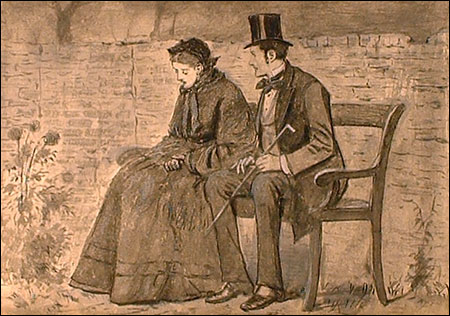
The New York Public Library, Berg Collection of
English and American Literature
Knowledge of the World.
This original pen-and-ink drawing by F.A. Fraser captures the final scene of Great Expectations, in which Pip and Estella, after a separation of many years, meet again on the desolate property where Miss Havisham's house once stood. In the original ending of the novel, after a chance encounter on Piccadilly, the two part ways forever, the once heartless Estella obviously chastened by what her life has been ("suffering ... had given her a heart to understand what my heart used to be"). However, the novelist Edward Bulwer Lytton, a close friend of Dickens, was convinced that Pip and Estella must be united at story's end. Dickens soon came to agree, and so he crafted a new ending for the novel, "as pretty a little piece of writing as I could," he told Forster. Very prettily done indeed, if not entirely convincing, it closes: "I took her hand in mine, and we went out of the ruined place; ... the evening mists were rising now, and in all the broad expanse of tranquil light they showed to me, I saw no shadow of another parting from her."
The Atlantic Monthly on Great Expectations-
"The author palpably uses his observations as materials for his creative faculties to work upon; he does not record, but invents; and he produces something which is natural only under conditions prescribed by his own mind. He shapes, disposes, penetrates, colors, and contrives everything, and the whole action is a series of events which could have occurred only in his own brain, and which it is difficult to conceive of as actually happening. And yet in none of his other works does he evince a shrewder insight into real life, and a clearer perception and knowledge of what is called the world. The book is, indeed, an artistic creation, and not a mere succession of humorous and pathetic scenes, and demonstrates that Dickens is now in the prime, and not in the decline of his great powers."
--from the original review of the novel, which appeared in the September 1861 issue of The Atlantic Monthly